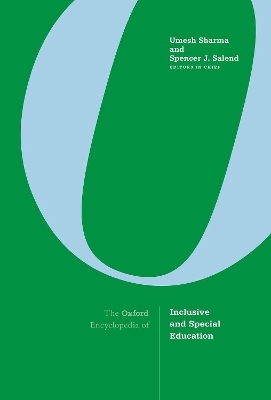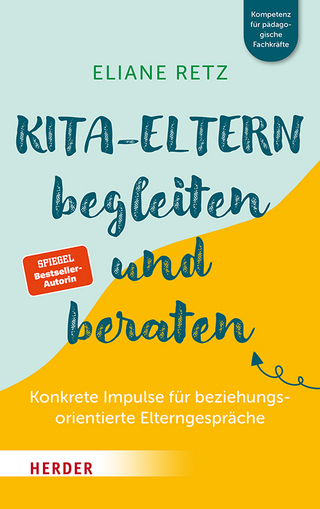
The Oxford Encyclopedia of Inclusive and Special Education
Oxford University Press Inc (Verlag)
978-0-19-087587-9 (ISBN)
Umesh Sharma is Professor in the Faculty of Education at Monash University, Australia, where he is the Academic Head of the Educational Psychology and Inclusive Education Community. Umesh's research programs in the area of disability and inclusive education span India, Pakistan, China, Bangladesh, Fiji, the Solomon Islands, Vanuatu, and Samoa, as well as Australia, Canada, the USA, and New Zealand. His project on the development of the Pacific Indicators for Inclusive Education received the Zero award in 2016 for outstanding policy development from the United Nations in Vienna. In 2019, he was named the top Special Education Researcher in Australia based on the impact of his work locally and internationally by the Australian Chief Scientist. His main areas of research are positive behavior support, inclusive education for disadvantaged children, and policy and practice in special and inclusive education. Spencer J. Salend is a Professor Emeritus of Educational Studies at the StateUniversity of New York at New Paltz and an educational consultant. He has published and consulted extensively on such topics as effective inclusive education policies and practices, evidence-based practices, Universal Design for Learning, classroom management techniques, educational assessment, model teacher education programs, and students from culturally and linguistically diverse backgrounds. He also has been the project director of and program evaluator for numerous international, federal, state-wide, and regional grants. He served as an expert consultant helping the American Federation of Teachers (AFT) develop and implement a performance-based teacher evaluation system and professional learning program that addresses Universal Design for Learning and highly effective practices for teachers of students with disabilities in inclusive classrooms. In recognition of the significance and benefit of his research and externally funded projects, he was selected as a recipient of the State University of New York's Faculty Scholar Award, the Chancellor's Research Recognition Award, and the Fulbright Specialist Program.
Addressing Dilemmas and Tensions in Inclusive Education
Assessment to Incite and Reconceptualize Learning
Assistive Technology to Enhance Inclusive Education
Attitudes and Inclusion of Students with Special Educational Needs in Regular Schools
Autism, Neurodiversity, and Inclusive Education
Best Practices for Working with Students with Physical Disabilities
Bridging the Gaps Between Theory and Practice of Inclusive Teacher Education
Calibrating Professional Learning Approaches for Teachers in Inclusive Classrooms in the Context of Implementation Science
A Collaborative Process for Incorporating Universal Design for Learning and Evidence-Based Practice into Inclusive Teacher Education Programs
Collaborative Teacher Inquiry for Inclusive Education
Creating Engaging Classrooms for All Learners
Data-based Decision Making
Differentiated Instruction and Inclusive Schooling
Disability Studies in Education and Inclusive Education
Diversity and Inclusion and Special Education
Dual Certification Programs
Effective Co-Teaching Practices within the Inclusive Classroom
Effective Practices for Collaborating with Families and Caregivers of Children and Young Adults with Disabilities
Effective Practices for Helping Students Transition to Post-Secondary Education
Effective Practices for Helping Students Transition to Work
Effective Practices for Helping Students with Neurodiversity Transition to Independent Living
Effective Practices for Teaching All Learners in Secondary Classrooms
Effective Practices for Teaching Content Area Reading
Effective Practices for Teaching Self-Determination
Effective Practices for Teaching Social Skills
Effective Practices for Teaching Writing to Students with Disabilities in the United States
Effective Self-Management Strategies
Effective Strategies for Improving Reading Comprehension
Evidence-based Practices for Teaching Learners on the Autism Spectrum
Evidence-Based Practices for Teaching Learners who are Deaf or Hard-of-Hearing in Regular Classrooms
Evidence-based Practices for Teaching Learners with Emotional and Behavioral Disorders
Evidence-based Practices for Teaching Learners with Mild to Moderate Disabilities
Evidence-based Practices for Teaching Learners with Multiple Disabilities
Evidence-based Practices for Teaching Students with Learning Disabilities
Evidence-based Practices for Working with Learners with Speech and Language Disabilities
Evidence-based Practices in Special Schooling
Examining the Cost of Special Education
Factors to Consider While Teaching Early Numeracy Skills in an Inclusive Education Setting
Financing Mechanisms to Support Inclusive Practice
High Leverage Practices in Elementary Inclusive Education
Historical and Philosophical Foundations of Inclusive Education
Inclusion and Pacific Island Countries
Inclusive and Special Education in Africa
Inclusive and Special Education in Asia
Inclusive and Special Education in Australia
Inclusive and Special Education in Canada and the United States
Inclusive and Special Education in Europe
Inclusive and Special Education in the Middle East
Inclusive and Special Education Policies in South America
Inclusive and Special Education Services in Rural Settings
Inclusive Education and European Educational Policy
Inclusive Education and the Progressive Inclusionists
Inclusive Education in Central America and the Caribbean
Inclusive Educational Principles, Policies, and Practices in Italy
Inclusive Societies
Influence of Medical and Social Perspectives of Disability on Models of Inclusive Education in the United States
In-Service Teacher Training for Inclusion
International Policies on Inclusion
Labeling and Inclusive Education
Learning Strategies Instruction
The Matter of 'Evidence' in the Inclusive Education Debate
Models of School-Family Relations
The Necessity for Coexistence of Equity and Excellence in Inclusive and Special Education
New Approaches to Designing and Administering Inclusive Assessments
Pedagogy for Inclusive Education
Policies and Practices that Foster Education for All: Implications for Economically Poor Nations
Policies that Foster Education for All: Implications for Economically Wealthy Nations
Preparation of German Special Educators for the 21st Century
Preparing Educators to Collaborate with Professionals Who Work with Learners with Complex Conditions
Preparing Student Social Workers to Support Inclusive Education in an Indian Context
Preparing Teaching Assistants for Including all Learners
Principals and School Leaders' Roles in Inclusive Education
Professional Development for Inclusive Education
Racial and Ethnic Disproportionality in Special Education Programs
Research Challenges and Innovative Methodologies, Approaches, and Processes
Response to Intervention
A Review of Existing and Potential Practices for Teaching Learners with Attention Deficit Hyperactivity Disorder
School Choice and Inclusive Education
School-Wide Positive Behavioral Interventions and Supports
Shaping Sustainable Inclusion Policy through Practice
Social Emotional Learning and Inclusion in Schools
Sociocultural Perspectives on Curriculum, Pedagogy, and Assessment to Support Inclusive Education
Special Education and Integrated Education in Hong Kong
Students with Special Needs Who Are Gifted and Talented (Twice Exceptional)
Teaching Efficacy and Inclusive Practices in Asian Countries
Teaching Learners with Vision Impairment: An Analysis of Evidence-Based Practice
Transforming Special Education with an Inclusive Rights-Based Approach
Transition Planning for Inclusion
Translating National Policies to School-Wide Practices
Universal Design for Learning: Changing the Way We Interact with Diversity
Using Technology to Prepare 21st-Century Educators
| Erscheinungsdatum | 04.05.2021 |
|---|---|
| Mitarbeit |
Chef-Herausgeber: Umesh Sharma, Spencer J. Salend |
| Verlagsort | New York |
| Sprache | englisch |
| Maße | 274 x 196 mm |
| Gewicht | 3567 g |
| Themenwelt | Sozialwissenschaften ► Pädagogik ► Didaktik |
| Sozialwissenschaften ► Pädagogik ► Sonder-, Heil- und Förderpädagogik | |
| Sozialwissenschaften ► Pädagogik ► Sozialpädagogik | |
| ISBN-10 | 0-19-087587-9 / 0190875879 |
| ISBN-13 | 978-0-19-087587-9 / 9780190875879 |
| Zustand | Neuware |
| Haben Sie eine Frage zum Produkt? |
aus dem Bereich


